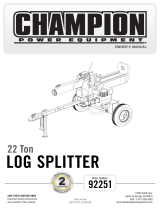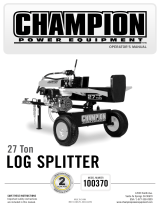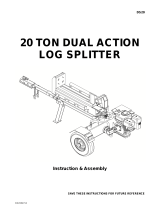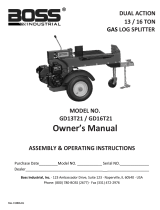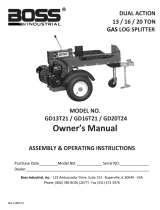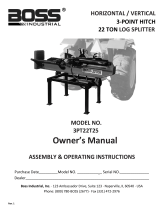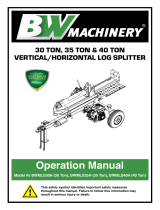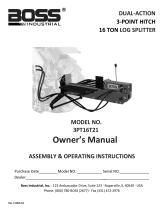Page is loading ...

OWNER’S MANUAL AND OPERATING INSTRUCTIONS
22 Ton
LOG SPLITTER
10006 Santa Fe Springs Road
Santa Fe Springs CA 90670
USA / 1-877-338-0999
www.championpowerequipment.com
SAVE THESE INSTRUCTIONS
Important Safety Instructions
are included in this manual.
MADE IN CHINA
REV 92252-20120524
92252
MODEL NUMBER
POWERED BY HONDA
™

Have questions or need assistance?
Do not return this product to the store!
WE ARE HERE TO HELP!
Visit our website:
www.championpowerequipment.com
for more info:
• Product Info & Updates
• Frequently Asked Questions
• Tech Bulletins
• Product Registration
– or –
Call our Customer Care Team Toll-Free at:
1-877-338-0999
*We are always working to improve our products. Therefore, the enclosed product may differ slightly from the image on the cover.

92252
TABLE OF CONTENTS
Introduction ............................ 1
Introduction .......................... 1
Portable Log Splitter .................... 1
Accessories .......................... 1
This Booklet .......................... 1
Manual Conventions ....................... 2
Safety Rules ............................ 3
Training ............................. 5
Preparation .......................... 5
Operation ............................ 6
Maintenance and Storage ................. 6
Controls and Features ..................... 7
Log Splitter .......................... 7
Assembly .............................. 8
Open Shipping Crate .................... 8
Assemble Tow Bar ...................... 8
Add Hydraulic Oil ...................... 9
Add Engine Oil ........................ 9
Add Engine Fuel ....................... 9
Operation ............................. 10
Before Each Use Inspect the Log Splitter ..... 10
Towing Log Splitter Safety ............... 10
Log Splitter Location ................... 10
Starting the Engine .................... 11
Stopping the Engine ................... 11
Log Splitter Operation .................. 11
Maintenance and Storage .................. 12
Engine Maintenance ................... 12
Log Splitter Maintenance ................ 12
Changing the Hydraulic Oil and Oil Filter ..... 12
Cleaning ........................... 13
Maintenance Schedule .................. 13
Storage ............................ 13
Log Splitter Storage ................. 13
Specifications .......................... 14
Log Splitter Specifications ............... 14
Hydraulic Oil System ................... 14
Engine Specifications .................. 14
Engine Fuel ......................... 14
Engine Oil .......................... 14
Spark Plugs ......................... 14
Maintenance Valve Clearance ............. 14
Parts Diagram ........................ 15
Parts List ........................... 16
Troubleshooting ......................... 17
Warranty ............................. 18
Warranty Qualifications ................. 18
Repair/Replacement Warranty ............. 18
Do Not Return The Unit To The
Place Of Purchase ..................... 18
Warranty Exclusions. . . . . . . . . . . . . . . . . . . . 18
Normal Wear ...................... 18
Installation, Use and Maintenance ........ 18
Other Exclusions .................... 18
Limits of Implied Warranty and Consequential
Damage .......................... 18
Contact Information .................... 18
Address .......................... 18
Customer Service ................... 18
Technical Service ................... 18
22 Ton
LOG SPLITTER

1 REV 92252-20120524
ENGLISH 92252
INTRODUCTION
Introduction
Congratulations on your purchase of a Champion
Power Equipment log splitter. CPE designs and builds
log splitters to strict specifications. With proper use
and maintenance, this log splitter will bring years of
satisfying service.
Portable Log Splitter
This unit is a gasoline engine driven hydraulic log splitter.
It is designed to split wood logs for use as firewood for
a stove or fireplace. This log splitter will only split logs
lengthwise, with the grain only.
Record the model and serial numbers as well as date and place of purchase for future reference. Have this information
available when ordering parts and when making technical or warranty inquiries.
Accessories
Champion Power Equipment manufactures and sells
accessories designed to help you get the most from your
purchase. To find out more, please visit our website at:
www.championpowerequipment.com
This Booklet
Every effort has been made to ensure the accuracy and
completeness of the information in this manual. We reserve
the right to change, alter and/or improve the product and
this document at any time without prior notice.
Champion Power Equipment Support
Model Number
Serial Number
Date of Purchase
Purchase Location
1-877-338-0999
92252
For Oil Type see “Add Engine Oil” section. For Fuel Type see “Add Fuel” section.

REV 92252-20120524 2
92252 ENGLISH
MANUAL CONVENTIONS
CAUTION indicates a potentially hazardous
situation which, if not avoided, may result in minor
or moderate injury.
CAUTION
CAUTION used without the safety alert symbol
indicates a potentially hazardous situation which, if
not avoided, may result in property damage.
CAUTION
This manual uses the following symbols to help differentiate between different kinds of information. The safety symbol
is used with a key word to alert you to potential hazards in operating and owning power equipment.
Follow all safety messages to avoid or reduce the risk of serious injury or death.
DANGER indicates an imminently hazardous
situation which, if not avoided, will result in death
or serious injury.
DANGER
WARNING indicates a potentially hazardous
situation which, if not avoided, could result in
death or serious injury.
WARNING
If you have questions regarding your log splitter, we can
help. Please call our help line at 1-877-338-0999
NOTE

3 REV 92252-20120524
ENGLISH 92252
SAFETY RULES
Log Splitter engine exhaust contains carbon
monoxide, a colourless. odourless, poison gas.
Breathing carbon monoxide will cause nausea,
dizziness, fainting or death. If you start to feel dizzy
or weak, get to fresh air immediately.
DANGER
Operate log splitter outdoors only in a well
ventilated area. DO NOT operate the log splitter
inside any building, enclosure or compartment.
DO NOT allow exhaust fumes to enter a confined
area through windows, doors, vents or other
openings. DANGER CARBON MONOXIDE, using a
log splitter indoors CAN KILL YOU IN MINUTES.
Rotating parts can entangle hands, feet, hair,
clothing and/or accessories. Traumatic amputation or
severe laceration can result.
DANGER
Keep hands and feet away from rotating parts. Tie up
long hair and remove jewellery. Operate equipment
with guards in place. DO NOT wear loose-fitting
clothing, dangling drawstrings or items that could
become caught.
Read this manual thoroughly before operating your
log splitter. Failure to follow instructions could result
in serious injury or death.
WARNING
The engine exhaust from this product contains
chemicals known to the state of California to cause
cancer, birth defects, or other reproductive harm.
WARNING
Sparks can result in fire or electrical shock.
DANGER
When servicing the engine:
Disconnect the spark plug wire and place it where
it cannot contact the plug. DO NOT check for spark
with the plug removed. Use only approved spark
plug testers.
Running engines produce heat. Severe burns can
occur on contact. Combustible material can catch
fire on contact.
DO NOT touch hot surfaces. Avoid contact with
hot exhaust gases. Allow equipment to cool before
touching. Maintain at least 91.4 cm (3 ft.) of
clearance on all sides to ensure adequate cooling.
Maintain at least 1.5 m (5 ft.) of clearance from
combustible materials.
WARNING
Crush hazard
Wedge can cut through skin and break bones. Keep
all limbs away from wedge and endplate.
WARNING
Projectile hazard
Pieces of log may be ejected from the splitter while
operating. Wear ANSI approved safety glasses when
operating. Be alert.
WARNING
Keep operator work zone clear
Keep work zone clear of debris while working to
ensure safe footing.
WARNING

REV 92252-20120524 4
92252 ENGLISH
SAFETY RULES
Fuel and fuel vapours are highly flammable and
extremely explosive.
Fire or explosion can cause severe burns or death.
Unintentional startup can result in entanglement,
traumatic amputation or laceration.
When adding or removing fuel:
Turn the engine off and let it cool for at least two
minutes before removing the fuel cap. Loosen the
cap slowly to relieve pressure in the tank.
Only fill or drain fuel outdoors in a well-ventilated area.
DO NOT pump gas directly into the log splitter
at the gas station. Use an approved container to
transfer the fuel to the log splitter.
DO NOT overfill the fuel tank.
Always keep fuel away from sparks, open flames,
pilot lights, heat and other sources of ignition.
DO NOT light or smoke cigarettes.
When starting the engine:
DO NOT attempt to start a damaged engine.
Make certain that the gas cap, air filter, spark plug,
fuel lines and exhaust system are properly in place.
Allow spilled fuel to evaporate fully before
attempting to start the engine.
Make certain that the log splitter is resting firmly on
level ground.
When operating the log splitter:
DO NOT move or tip the log splitter during
operation.
DO NOT tip the log splitter or allow fuel or oil to
spill.
Block the tires to prevent unintended movement.
When transporting or servicing the log splitter:
Make certain that the fuel shutoff valve is in the off
position and the fuel tank is empty.
Disconnect the spark plug wire.
When storing the log splitter:
Store away from sparks, open flames, pilot lights,
heat and other sources of ignition.
DANGER
Skin injection hazard. High-pressure hydraulic oil
can inject under your skin.
DANGER
Make sure all fittings are tightly secure before
applying pressure. Relieve system of pressure
before servicing.
Towing hazard
ALWAYS check all local and state regulations
regarding towing, licensing and lights before towing
your log splitter. Review towing safety warnings in
your towing vehicle manual.
Drive safely. Be aware of the added length of the
log splitter. NEVER ride or transport cargo on the
log splitter. Choose a level surface to operate the
log splitter.
NEVER EXCEED MAX. Towing Speed
72 km/h (45 MPH)
WARNING
Rapid retraction of the starter cord will pull hand and
arm towards the engine faster than you can let go.
Unintentional startup can result in entanglement,
traumatic amputation or laceration.
Broken bones, fractures, bruises or sprains could
result.
When starting engine, pull the starter cord slowly
until resistance is felt and then pull rapidly to avoid
kickback.
WARNING
Improper treatment or use of the log splitter can
damage it, shorten its life and void your warranty.
Use the log splitter only for intended uses. Operate
only on level surfaces. DO NOT expose log splitter
to excessive moisture, dust, or dirt.
DO NOT allow any material to block the cooling
slots. DO NOT use the engine if:
– Equipment sparks, smokes or emits flames
– Equipment vibrates excessively
CAUTION
Parts of the hydraulic circuit (cylinder, pump, valve-
body, hoses) can become very hot during operation.
CAUTION

5 REV 92252-20120524
ENGLISH 92252
SAFETY RULES
Training
1. Read the Operator’s Manual completely before
attempting to use this log splitter.
2. Do not allow anyone to operate your log splitter who
has not read the Operator’s Manual or has not been
instructed on the safe use of the log splitter.
3. Never allow children or untrained adults to operate
this machine.
4. Many accidents occur when more than one (1)
person operates the log splitter. If a helper is
assisting in loading logs to be split, never actuate
controls until helper is clear of the area.
5. Never allow anyone to ride on the machine.
6. Never transport cargo on the log splitter.
7. High fluid pressures are developed in hydraulic
log splitters. Pressurized hydraulic fluid escaping
through a pin hole opening can puncture skin
and cause sever blood poisoning. Therefore, the
following instructions should be heeded at all times.
a. Do not operate the unit with frayed, kinked,
cracked or damaged hoses, fittings, or tubing.
b. Stop the engine and relieve hydraulic system
pressure before changing or adjusting fittings,
hoses, tubing, or other system components.
c. Do not adjust the pressure settings of the
pump or valve.
d. Do not check for leaks with your hand.
Leaks can be detected by passing cardboard
or wood over the suspected area. Look for
discolouration. If injured by escaping fluid,
see a doctor at once. Serious infection
or reaction can develop if proper medical
treatment is not administered immediately.
8. Keep the operator zone and adjacent area clear for
safe, secure footing.
9. If your log splitter is equipped with an internal-
combustion engine and intended for use near any
unimproved forest, brush, or grass covered land,
the engine exhaust should be equipped with a spark
arrestor. Make sure you comply with local, state,
and federal codes. Take appropriate fire-fighting
equipment with you.
10. Log splitters should be used only for splitting
wood. Do not use for other purposes unless
the manufacturer provides attachments and
instructions.
Preparation
1. Be thoroughly familiar with all controls and with
proper use of the equipment.
2. Safety Gear:
a. Always wear safety shoes or heavy boots
when operating the machine.
b. Always wear safety glasses or goggles when
operating the machine.
c. Never wear jewelry or loose-fitting clothing
that might become entangled in moving or
rotating parts of the machine.
3. Make sure the splitter is on a level surface. Block
tires and ensure support leg is secure to prevent
unintended movement of the log splitter during
operation.
a. Always operate the splitter from the
manufacturer’s indicated operator zone.
4. Logs to be split on ram-type units should be cut as
squarely as possible.
5. Fuel:
a. Use an approved fuel container.
b. Never add fuel to a running or hot engine.
c. Fill fuel tank outdoors with extreme care.
Never fill fuel tank indoors.
d. Replace gasoline cap securely and clean up
any spilled fuel.

REV 92252-20120524 6
92252 ENGLISH
SAFETY RULES
Maintenance and Storage
1. Always shut off the power source while repairing or
adjusting the splitter except as recommended by
the manufacturer.
2. Clean debris and chaff from the engine cylinder,
cylinder head fins, blower house rotation screen,
and muffler areas. If the engine is equipped with a
spark arrestor muffler, clean and inspect it regularly
(follow manufacturer’s service instructions).
Replace, if damaged.
3. Never store the unit indoors with fuel in the tank.
Fumes might reach an open flame spark. Allow the
engine to cool before storing in any enclosure.
4. Clear debris from moveable parts, but only when
the power source is shut off.
5. Check to be sure all nuts and bolts are tight to
assure the equipment is in safe working condition.
Operation
1. Before starting this log splitter, review all safety
rules. Failure to follow these rules may result in
serious injury to the operator or bystanders.
2. Be sure to confirm all hose connections and hose
clamps are tight before each use. It is possible for
connections to vibrate loose over time.
3. Never leave the machine unattended with the power
source operating.
4. Never operate the machine when under the
influence of alcohol, drugs or medication.
5. The machine owner should instruct all operators in
safe log splitter operation.
6. Always operate the log splitter with all safety
equipment in place and all controls properly
adjusted for safe operation.
7. Always operate the log splitter at manufacturer’s
recommended speed.
8. Always keep hands and feet clear of moving parts.
9. When loading a ram-type log splitter, place your
hands on the sides of the log, not the ends. Never
place your hands or any part of your body between
a log and any part of the log splitter.
a. On ram-type log splitters, never attempt to
split more than one (1) log at a time unless
the ram has been fully extended and a second
log is needed to complete the separation of
the first log.
10. On ram-type log splitters on which the logs are not
cut square, the longest portion of the log should
be rotated down and the most square end placed
against the ram.
11. Use only your hand to operate the log splitter
controls.
12. Do not refuel the engine until it has cooled for
several minutes.

7 REV 92252-20120524
ENGLISH 92252
CONTROLS AND FEATURES
Read this owner’s manual before operating your log splitter. Familiarize yourself with the location and function of the
controls and features. Save this manual for future reference.
Log Splitter
(1) 5 cm (2 in.) Ball Coupler – For towing the log
splitter behind your vehicle.
(2) Hydraulic Cylinder – Bore 10.2 cm (4 in.) x 57.5
cm (22.63 in.) stroke. Rated to 3500 psi.
(3) Mounting Plates – Holds hydraulic cylinder in
place.
(4) Control Valve Handle – Controls the movement of
the cutting wedge.
(5) Wedge
(6) Splitting Beam
(7) Log Catchers
(8) Engine – Honda GX 200.
(9) Tires – Maximum travel speed is 72 km/h (45
MPH).
(10) Hydraulic Pump – Pumps hydraulic oil through the
system.
(11) Beam Lock Pin – Secures in either horizontal or
vertical position.
(12) Beam Bracket – Holds splitting beam in place.
(13) Support Leg – Supports log splitter while
operating. Raise leg for towing.
(14) Safety Chains – For use while towing.
1
2
5
6
10
7
8
13
9
14
4
3
12
11

REV 92252-20120524 8
92252 ENGLISH
ASSEMBLY
Your log splitter requires some assembly.
If you have any questions regarding the assembly of your
log splitter, call our help line at 1-877-338-0999. Please
have your serial number and model number available.
Open Shipping Crate
1. Set the shipping crate on a solid, flat surface.
2. Carefully cut the shipping bands and remove lid of
shipping crate.
3. Locate all hardware before beginning assembly.
Assemble Tow Bar
1. Remove splitting beam lock pin that attaches beam to
tow bar in horizontal position. (A)
2. Remove the 2 nuts and bolts that fasten the tow bar to
the hydraulic oil tank. (B)
3. Slide the tow bar out to align the bolt holes (C) at the
end of the tow bar with the mounting holes (D) on the
the hydraulic tank.
4. With the tow bar in extended position, replace 2 nuts
and bolts removed in step 2 and tighten to 47.45 joules
(35 ft-lb). (E)
5. Remove 2 bolts and shipping bracket fastened to the
bottom of the splitting beam near the pivot (F). Discard
shipping bracket and hardware.
6. Replace splitting beam lock pin removed in step 1 to
secure beam in horizontal position. (G)
A
B
DC
G
E
F
Log Splitter Location Cont’d.

9 REV 92252-20120524
ENGLISH 92252
When temperature is below 0ºC (32ºF) use
universal tractor/transmission fluid.
NOTE
ASSEMBLY
Add Engine Oil
Refer to Honda Engine Owner’s Manual for adding oil.
Add Engine Fuel
Refer to Honda Engine Owner’s Manual for adding fuel.
6. Start Engine. Extend and retract the wedge to purge
air from the hydraulic system. When the wedge
motion is smooth, the system is properly purged.
7. Check the hydraulic oil tank sight glass. Add
approximately 3.78 L to 5.67 L (1 to 1.5 gallons) of
hydraulic oil to bring the level back up to the sight
glass.
8. Check oil level daily and add as needed.
Add Hydraulic Oil
1. Make sure the log splitter is on a flat, level surface.
2. Remove the oil plug from the oil tank. (A)
3. Add 18.9 L (5 gal.) of hydraulic oil - 10W AW32, ASLE
H-150, or ISO 32 are all acceptable types of fluid.
4. Check the hydraulic oil level using the oil sight glass.
Oil level should visibly fill the glass sight. (B)
5. Replace and tighten the oil plug and orient the vent
hole away from the operator zone.
DO NOT remove the hydraulic oil fill cap when the engine
is running or hot. Hot oil can escape causing severe
burns. Always allow the log splitter to cool completely
before removing the hydraulic oil cap.
High fluid pressure and temperatures are created in the
hydraulic log splitters. Hydraulic fluid will escape through
a pin-size hole opening and can puncture skin and cause
severe blood poisoning.
Inspect hydraulic system regularly for possible leaks.
Never check for leaks with your hand while the system
is pressurized. Seek medical attention immediately if
injured by escaping fluid.
WARNING
A
B

REV 92252-20120524 10
92252 ENGLISH
OPERATION
Log Splitter Location Cont’d.
Before Each Use Inspect the Log Splitter
1. Check the hydraulic oil level and visually inspect all
hoses, attachments and cylinder for leaks, cracks,
fraying or other damage.
2. DO NOT operate the log splitter if there is any
indication of damage or oily residue.
3. Inspect the engine and make sure the oil level is
correct before operating. If the engine is equipped
with a spark arrestor, clean and inspect it regularly
(follow spark arrestor maintenance schedule).
4. The tires need to be fully inflated and in good repair.
Reference the tire sidewall for recommended tire
pressure.
Towing Log Splitter Safety
1. Always check local and state regulations regarding the
requirements for towing, licensing and lights.
2. Before towing make sure the log splitter is correctly
and securely attached to the vehicle and the safety
chains attached with enough slack to allow for turning.
3. Never exceed the max. travel speed of 72 km/h (45
MPH). Towing the log splitter at speeds greater than
72 km/h (45 MPH) could result in serious injury or
death. Always adjust your towing speed according to
the terrain and conditions.
4. Always disconnect the log splitter from the towing
vehicle before operating.
Log Splitter Location
This log splitter must have at least 2.1 m (7 ft.) of
clearance from combustible material. Leave at least 91.4
cm (3 ft.) of clearance on all sides of the log splitter to
allow for adequate cooling, maintenance and servicing.
DO NOT place the log splitter near vents or intakes where
engine exhaust fumes could be drawn into occupied or
confined spaces. Always operate the log splitter outdoors.
The log splitter needs to be on a dry, level surface with
good footing. DO NOT work on mud, ice, tall grass, brush
or snow.
Only operate log splitter from work zone shown below.
Vertical Operating
Position
W
o
r
k
Z
o
n
e
Horizontal Operating
Position
W
o
r
k
Z
o
n
e
For Vertical Operation:
– Remove the beam lock-pin from the beam
bracket
– Use handle on cylinder to rotate beam to vertical
position
– Insert beam lock-pin in the pivot bracket
NOTE
DO NOT overinflate tires. Serious injury can result if
tires explode.
DO NOT tow the log splitter if the tires are worn or
will not hold air.
DO NOT exceed the maximum 72 km/h (45 MPH)
towing speed.
WARNING

11 REV 92252-20120524
ENGLISH 92252
OPERATION
Starting the Engine
Refer to Honda Engine Owner’s Manual.
ALWAYS use the log splitter for its intended use. The
log splitter should only be used to split wood logs,
length wise with the grain.
NEVER modify, alter or change the log splitter in
anyway. Modifications will void the warranty.
NEVER attach a rope, cable or other device to the
control lever on the log splitter.
DO NOT modify or change the engine and operating
speeds or pressure settings. These changes can
cause safety issues.
ONLY operate the log splitter in daylight.
NEVER operate, or let anyone else operate, the log
splitter while under the influence of alcohol, drugs,
or medication.
NEVER leave the log splitter unattended while the
engine is running.
DO NOT change the splitting position with the engine
running. Contact with the muffler can cause serious
burns.
Always make sure the beam is in the locked position.
DO NOT let the beam drop as it could crush fingers
or cause damage to the log splitter.
WARNING
Log Splitter Location Cont’d. Log Splitter Operation Cont’d.
Stopping the Engine
Refer to Honda Engine Owner’s Manual.
HORIZONAL position is used for lighter logs that can
easily be loaded onto the beam.
VERTICAL position is used for light logs as well as
heavy logs that are difficult to load onto the beam.
Back injury can result from lifting logs onto the log
splitter if proper lifting techniques are not used.
NOTE
It is normal for the hydraulic fluid to become foamy
or frothy during operation.
NOTE
If a log gets stuck, embedded or will not split
completely, push the control handle in the reverse
direction and allow the splitter to strip the log from
the wedge.
ALWAYS keep hands clear of the log and wedge
while it is retracting.
NOTE
Log Splitter Operation
1. ALWAYS wear ear and eye protection, protective clothing
and safety gear.
2. Block tires and put both support legs in the DOWN
position to prevent unintended movement of the log
splitter during operation.
3. Set log splitter in either the horizontal or vertical
position.
4. Load a log onto the beam against the end plate
(MAX LOG LENGTH – 60.3 cm {23.75-in.}).
5. Make sure all limbs are clear of crush zones.
6. Push the control valve handle forward (towards the
end plate) to split the log.
7. Push the auto control valve handle backward to
return the wedge to its original position.
8. Clear the split wood from the work zone.
Do not hold auto control valve in return position. It
will damage the stop block or beam.
CAUTION
The cylinder stroke is designed so the wedge stops
approximately 3.81 cm (1.5 in.) from the end plate.
NOTE

REV 92252-20120524 12
92252 ENGLISH
MAINTENANCE AND STORAGE
1. Begin with the cylinder retracted and the engine
“O F F.”
2. Turn the fuel valve “OFF.”
3. Release any stored pressure by moving the valve
lever forward and backward several times.
4. Place a container under the hydraulic tank. Make
sure it is large enough to hold the contents of the
tank.
5. To drain the oil, unscrew and remove the tank drain
plug on the bottom of the hydraulic tank.
a. Unscrew and remove the hydraulic oil filter.
b. Drain any oil in the filter into the container.
6. Allow oil to completely drain from the tank into the
container.
7. Install a new hydraulic oil filter. (A)
a. Turn the filter counter-clockwise to remove it.
A strap wrench may be used.
b. Lubricate the gasket of the new filter with a
thin film of clean oil.
c. Screw the new filter on clockwise. Tighten
¾ to 1 turn after the gasket makes contact.
8. Reinsert and screw in the tank drain plug. Tighten,
but do not overtighten.
B
AC
Install a new hydraulic oil filter each time the
hydraulic oil is changed
NOTE
The drain plug is sealed with Teflon tape. Add 2-3
wraps of new Teflon tape as needed when replacing
the drain plug to prevent oil leak
NOTE
Changing the Hydraulic Oil and Oil Filter
9. Unscrew and remove the tank fill plug, on top of the
tank. Using a funnel add approximately 18.9 L
(5 gal.) of hydraulic oil to the tank. Wipe up any
spilled oil. (B)
The owner/operator is responsible for all periodic
maintenance.
Complete all scheduled maintenance in a timely manner.
Correct any issue before operating the log splitter.
Improper maintenance will void your warranty.
For service or parts assistance, contact our help line
at 1-877-338-0999.
NOTE
Never operate a damaged or defective log splitter.
WARNING
WARNING
Engine Maintenance
Refer to Honda Engine Owner’s Manual.
Log Splitter Maintenance
Make certain that the log splitter is kept clean and stored
properly. Only operate the unit on a flat, level surface in
a clean, dry operating environment. DO NOT expose the
unit to extreme conditions, excessive dust, dirt, moisture
or corrosive vapours.
Inspect all air vents and cooling slots to ensure that they
are clean and unobstructed.
Check and tighten all bolts and nuts before operating the
log splitter.
Be sure to confirm all hose connections and hose clamps
are tight before each use. It is possible for connections
to vibrate loose over time.

13 REV 92252-20120524
ENGLISH 92252
MAINTENANCE AND STORAGE
Always shut off the engine, disconnect the spark
plug, and relieve system pressure before cleaning,
adjusting, or repairing the splitter. Relieve system
pressure by moving split control lever back and
forth several times
WARNING
Change the hydraulic oil filter after the first 50 hours
of use. Then every 100 hours or seasonally.
NOTE
Replacement filters can be purchased from
Champion Power Equipment by calling
1-877-338-0999. Wix #51391 or Fram PH3682
can also be used if needed.
NOTE
Changing the Hydraulic Oil and Oil Filter Cont’d.
10. Turn the fuel valve on, and start the engine. Purge
the air from the system by extending and retracting
the wedge several times until the motion is smooth.
11. Check the hydraulic oil level using the sight glass.
Add 3.79 to 5.69 L (1 to 1.5 gal.) of hydraulic oil,
so the oil level is visible in the sight glass. (C)
12. Dispose of used oil at approved recycling locations.
DO NOT use a garden hose to clean the engine or
log splitter.
CAUTION
Water can contaminate the fuel system and can
enter the engine through the cooling slots and
damage the engine.
Maintenance Schedule
Follow the service intervals indicated in the schedule
below. Service your log splitter more frequently when
operating in adverse conditions. Contact our help line at
1-877-338-0999 to locate the nearest Champion Power
Equipment authorized service dealer for your log splitter
or engine maintenance needs.
Every 8 hours or daily
Check hydraulic oil levels
Every 100 hours or every season
Change hydraulic oil
Change hydraulic oil filter
Every Year
Inspect wheel bearings and repack bearing grease
as needed.
Engine and Fuel Maintenance
Refer to Honda Engine Owner’s Manual.
Cleaning
Clear the debris from the beam, wedge and endplate. Use
a damp cloth to clean exterior surfaces of the engine and
log splitter.
Use a soft bristle brush to remove excess dirt and oil. Use
an air compressor (25 PSI) to clear dirt and small debris.
Wipe all metal parts with an oily rag to help prevent rust
and corrosion.
Storage
Log Splitter Storage
1. The log splitter needs to be cool for at least 5
minutes before storing.
2. Clean the log splitter before storage according to
the Maintenance section.
3. Retract the wedge to protect the rod from corrosion.
4. Wipe the beam and wedge with an oily rag to
prevent rust and corrosion.
Never store the log splitter inside next to appliances
where there is a source of heat or open flame,
spark or pilot light because they can ignite gasoline
vapours.
DO NOT store a log splitter near fertilizer or any
corrosive material.
Even with an empty gas tank, gasoline vapours
could ignite.
WARNING

REV 92252-20120524 14
92252 ENGLISH
Engine Oil
Refer to Honda Engine Owner’s Manual for adding oil.
Engine Fuel
Refer to Honda Engine Owner’s Manual for adding fuel.
SPECIFICATIONS
Maintenance Valve Clearance
Refer to Honda Engine Owner’s Manual.
Spark Plugs
Refer to Honda Engine Owner’s Manual.
Hydraulic Oil System
Oil capacity is 24.6 L (6.5 gallons).
Use types 10W AW32, ASLE H-150, ISO32 or universal
hydraulic fluid.
Spin-On Filter – 15 GPM, 10 Micron, ¾-16 Thread.
When temperature is below 0ºC (32ºF) use
universal tractor/transmission fluid.
NOTE
Engine Specifications
Refer to Honda Engine Owner’s Manual.
Log Splitter Specifications
– Ram Force ........................ 22 Ton
– Max Cycle Time ................. 14 seconds
– Hydraulic Tank Capacity .......... 18.9 L (5 gal.)
– Max Log Length ........... 60.3 cm (23.75-in.)
– Max Log Weight .............. 45 kg (100 lb.)
– Coupler Ball Size ................. 5 cm (2 in.)
– Tire Size ................... 40.6 cm (16 in.)
– Max towing speed ........... 72 km/h (45 MPH)
– Engine ...................... Honda GX 200
– Cylinder size .. 10.2 cm x 57.5 cm (4 in. x 22.63 in.)
– Cylinder rod size ............... 4 cm (1.57 in.)
– Hydraulic Fluid Type .............. 10W AW32,
......................ASLE H-150, ISO 32
– Gear Pump ........................ 2-stage
– Max pressure ..................... 3500 psi
– Max flow capacity .......... 41.6 LPM (11 GPM)
– Control Valve ............. Detent (auto-return)
– Overall Dimensions
– Gross Weight ............... 220 kg (485 lb.)
– Net Weight ................ 180 kg (396.8 lb.)
– Height ................. 116.5 cm (45.87 in.)
– Width ................. 103.5 cm (40.75 in.)
– Length. . . . . . . . . . . . . . . . . . . 218 cm (85.83 in.)

15 REV 92252-20120524
ENGLISH 92252
Parts Diagram
SPECIFICATIONS
1
2
3456
778
7980
15 14
10
11
12
13
16
17
13
8
2118 2019
81
82
43
25 27 35
70
68
23
22 67
69
5 4
72
6462
6160
71
57 58 59
65
66
14
26
15
24
36
37
38
39
41
40
40
42 20 19 43
44
56
52 53 54 55
46
19
20
51 50
47
49
48
31
3433
32
28
23
30
5
29
77
73
73
75
(B)
(A)
63
43 19 20
(C)
(D)
(F)
45
TO(E)
TO(A)
TO(B)
TO(C)
TO(D)
TO(F)
E
9
81
75
84
4
5

REV 92252-20120524 16
92252 ENGLISH
Parts List
# Part Number Description Qty
1
PMJ22H-02-00 Beam 1
2
GB/ T-5782-
2000-M12-75
Bolt M12×75(12.9) 1
3
PMJ22J-04-00 Wedge Slide 1
4
GB90 -W-12 Washer 12
5
5
GB /T-889.1-
2000-M12
Lock Nut M12
6
6
PMJ22G-51 Filter Housing "IN" Connection
1
7
PMJ22 J-12 Control Valve
1
8
PMJ22G-24 Valve Joiner
1
9
JB-982-1977-14 Combination Washer 14
4
10
PMJ22G-25 Valve Joiner
1
11
GB /T-3452.1-92-14-
2.65
"O" Ring 14×2.65
1
12
PMJ22G-22 Front Cover Connector
1
13
PMJ22G-23 Bolt Connector
2
14
PMJ22G-49 Filter Housing "OUT" Connection
2
15
JB/T-8870-1999-25 Clamp d25
2
16
PMJ22G-16 Hydraulic Hose(Valve-Cylinder)
1
17
PMJ22J-08-00 Cylinder
1
18
GB5781-B8-20 Bolt M8×20
8
19
GB93-LW-8 Lock Washer 8
20
20
GB90-W-8 Washer 8
20
21
PMJ22J-03 Cylinder Fixing Plate
2
22
PMJ22 J-15 Pin
1
23
PMJ22G-30 R Pin
2
24
PMJ22G-15 Hydraulic Hose(Valve-Oil Tank)
1
25
GB90 -W-10 Washer 10
8
26
PMJ22H-01-00 Tow Bar
1
27
GB93-LW-10 Lock washer 10
8
28
PMJ22 J-10 Pin
1
29
PMJ22G-40 2" Coupler
1
30
GB/ T-5782-
2000-M12-80
Bolt M12×80
2
31
PMJ22J-07-00 Front Support Leg
1
32
PMJ22G -41 Safety Chain With Hook
2
33
GB90 -W-12 Washer 12
4
34
GB/ T-5782-
2000-M12-90
Bolt M12×90
1
35
GB /T-5781-
2000-M10-15
Bolt M10x15
8
36
PMJ22 J-18 Hydraulic Hose(Valve-Pump)
1
37
GB /T-3452.1-92-10-
2.65
"O" Ring 10×2.65
1
38
PMJ22G-21 Outlet Connector Of Pump
1
39
PMJ22 J-14 Gear Pump
1
40
JB/T-8870-1999-40 Clamp d40
2
41
PMJ22G-17 Oil Pipe
1
42
GB5781-B8-30 Bolt M8×30
4
# Part Number Description Qty
43
GB41-N-8 Nut M8
9
44
GB1667-S6-10 Screw M6×10
1
45
PMJ22G-26 Gear Pump Connector
1
46
ASME-B18.2.1-1996 Bolt 5/16"-24×1"
4
47
PMJ22G-29 Engine Bushing
1
48
PMJ22G-196CC-G10 Engine
1
49
GB / T-1096-1979 Flat Key
1
50
PMJ22G-28 Engine Connector
1
51
PMJ22G-27 Gear Pump Stand
1
52
PMJ22G-32 Connector Cover
1
53
GB/T-845C-1985 Tapping Screw
4
54
GB93-LW-4 Lock Washer 4
4
55
GB90-W-4 Washer 4
4
56
GB / T-1096-1979 Flat Key
1
57
GB1667-S5-20 Screw M5×20
6
58
GB93-LW-5 Lock Washer 5
6
59
GB90-W-5 Washer 5
6
60
PMJ22G-07-00 Filter Fix Plate
1
61
PMJ22G-44 Filter
1
62
PMJ22G-19 Oil Plug
1
63
GB /T-3452.1-92-80-
3.55
"O" Ring 80×3.55
1
64
GB/ T-5782-
2000-M8-45
Bolt M8×45
4
65
PMJ22G-52 Auto Filter
1
66
PMJ22G-50 Auto Filter Base
1
67
PMJ22G-18 Screw NPT1"
1
68
GJY12-3 R Pin
1
69
GB/ T-5782-
2000-M12-85
Bolt M12×85
2
70
PMJ22G-12 Hinge Pin
1
71
PMJ22H-11-0 0 Oil Tank
1
72
GB/T-91-2000-
CP4-32
Cotter Pin 4×32
2
73
PMJ22J-05-01 Cased Seal
2
74
L44634-LYC-DS Tapered Bearing
4
75
PMJ22J-05-03 Wheel
2
76
GB/ T-6181-
86-M20 -1.5
Slotted Nut M20x1.5
2
77
PMJ22J-05-02 Axle Cap
2
78
PMJ22 J-19 Plate
1
79
GB90-W-8 Washer 8
2
80
GB5781-B8-12 Bolt M8x12
2
81
PMJ22G-38 Big Tension Spring
1
82
GB/T-798-
1988-M8-28
Swing Bolt M8x28
1
83
GB -1160.2-89 Oil Scale
1
84
PMJ22F-01 Log Catcher
2

17 REV 92252-20120524
ENGLISH 92252
TROUBLESHOOTING
For further technical support:
Technical Service
Mon – Fri 8:30 AM – 5:00 PM (PST/PDT)
Toll Free: 1-877-338-0999
tech@championpowerequipment.com
Problem Cause Solution
Wedge movement is slow or erratic. Air in the hydraulic oil system. Purge air by extending and retracting
the wedge several times until motion
is smooth.
Debris lodged in beam guides. Clear debris from beam.
Low hydraulic oil. Check oil level and add as needed.
Oil leak from hose connection. Loose hose clamp or hydraulic fitting. Tighten hose clamp or hydraulic
fitting.
Oil leak from cylinder. Faulty cylinder rod seal. Contact Customer Service.
Scored or bent cylinder rod. Contact Customer Service.
Loose hydraulic fitting. Tighten hydraulic fitting.
Faulty combination washer seal on
cylinder hydraulic fitting.
Contact Customer Service.
Wedge will not extend or retract. Faulty control valve. Contact Customer Service.
Faulty hydraulic pump. Contact Customer Service.
Low hydraulic oil. Check oil level and add as needed.
Wedge does not Auto-Return. Low hydraulic oil. Check oil level and add as needed.
Faulty control valve. Contact Customer Service.
Excessive bouncing while towing. Under-inflated tires. Inflate tires to proper pressure. Refer
to tire sidewall.
/


